Mike's Content

Michael Campbell’s MoneyTalks Show Nov 30th (First 1/2 Hour) including Michael’s shocking commentary on the Bear Market in Jobs
{mp3}mtnov30lead3fp{/mp3}
In the Final Hour Michael interviews the impressive John Johnston, Chief Strategist for Davis Rea. Someone who offers a compelling alternative view to the economic/investment environment. The evidence points to a great deleveraging.
{mp3}mtnov30hour1fp{/mp3}

Congress’s latest attempt at crafting a budget plan is on track to end up the same way as others have in the past decade: with little or no agreement.
Negotiators have little chance of breaking this string of futility, even after a 16-day government shutdown in October that cost the U.S. economy $24 billion. If they do, it’ll only be to curb automatic spending cuts, including $19 billion that hits the Pentagon starting in January.
Now budget experts, labor unions and business groups are saying enough’s enough, and questioning why lawmakers can’t live within their means the way ordinary Americans do and instead lurch from one budget standoff to the next.
“It’s a stupid way to run a country,” said Maya MacGuineas, head of the Campaign to Fix the Debt, a non-partisan advocacy group whose members include business leaders and former lawmakers. “Change comes from two possible things: a crisis or leadership.”
One of the co-chairmen of the campaign is Michael Bloomberg, founder and majority owner of Bloomberg News parent Bloomberg LP and the New York City mayor.
Unlike with previous budget panels, including the failed 2011 supercommittee, there are no immediate consequences if the budget conference misses its Dec. 13 deadline — the U.S. won’t default on its debt and the federal government won’t shut down for lack of funding.
The committee’s lack of progress is frustrating outside groups, especially business executives, who say congressional lawmakers’ habit of governing by crisis and temporary spending bills is hurting the economy and costing jobs.
‘Chilling Effect’
“The uncertainty has a chilling effect on job creators, households and anybody who’s trying to see around a corner,” said MacGuineas, who is also president of the Committee for a Responsible Federal Budget, a fiscal advocacy group.
Congress in 2009 last passed a budget resolution, the equivalent of a household budget that sets spending parameters for the federal government.
In 2010, disagreement over how to handle the scheduled expiration of tax cuts enacted under former President George W. Bush prevented agreement on a budget resolution and Republicans won the House majority, creating a divided Congress.
The current panel is the fifth bipartisan attempt in three years to address the nation’s debt and deficit. The others, starting with the 2010 debt-reduction commission appointed by President Barack Obama, ended in failure.
….continue reading on HERE

 Warren Buffett is the most famous investor in the world. He also loves sharing his advice with kids as part of his Secret Millionaires Club.
Warren Buffett is the most famous investor in the world. He also loves sharing his advice with kids as part of his Secret Millionaires Club.
The following are questions he answered in a recent interview, including what he thinks the biggest mistake is that parents make when teaching their kids about money and how he learned about money.
Do you think most parents do a good job teaching their kids about money?
Buffet: Most parents know how important it is to teach kids about money and managing it properly. There was a study many years ago questioning how to predict business success later in life. The answer to the study was the age you started your first business impacted how successful you were later in life. By teaching kids sound financial habits at an early age, gives all kids the opportunity to be successful when they are an adult.
What do you think is the biggest mistake parents make when teaching their kids about money?
Buffet: I think parents need to start teaching kids about the importance of managing money at an early age. Sometimes parents wait until their kids are in their teens before they starting talking about managing money when they could be starting when their kids are in preschool.
What made you want to launch the Secret Millionaires Club? What do you hope kids get out of it?
Buffet: There are a number of educational programs out there, but there are not many programs that teach about Financial Literacy at an early age. Secret Millionaires Club can help kids develop the right habits that will serve them well for the rest of their life. If this program can have some effect on youngsters and help them develop better habits on money, it can have a major impact on their life when they are older.
Where did you learn about money?
Buffet: My dad was my greatest inspiration. He was my hero when I was six and he is still my hero now. He is an inspiration to me in every way. What I learned at an early age from him was to have the right habits early. Savings was an important lesson he taught. I had all kinds of small businesses when I was growing up. When I was six I started my first business. I bought a six pack of Coke for 25 cents and sold the cans for a nickel apiece. I also sold magazines and gum door to door.


This is a review of Technology, Materials, Consumer Discretionary, Industrials, Energy, Financials, Consumer Staples, Health Care & Utilities:
Technology
· Trend remains up (Score: 1.0). Units closed at a 13 year high on Wednesday
· Units remain above their 20 day moving average (Score: 1.0)
· Strength relative to the S&P 500 Index changed from negative to neutral (Score: 0.5)
· Technical score based on above indicators improved to 2.5 from 2.0 out of 3.0
· Short term momentum indicators returned to overbought levels.
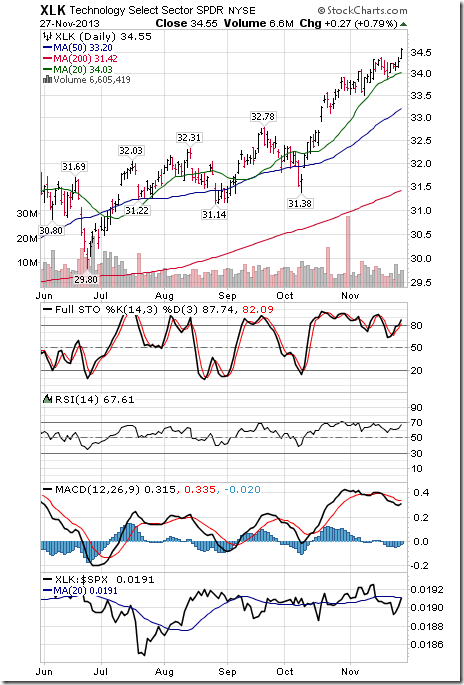
Materials
· Trend remains up. Resistance is forming at $46.07.
· Units remain above their 20 day moving average
· Strength relative to the S&P 500 Index remains negative
· Technical score remains at 2.0 out of 3.0
· Short term momentum indicators are rolling over from overbought levels
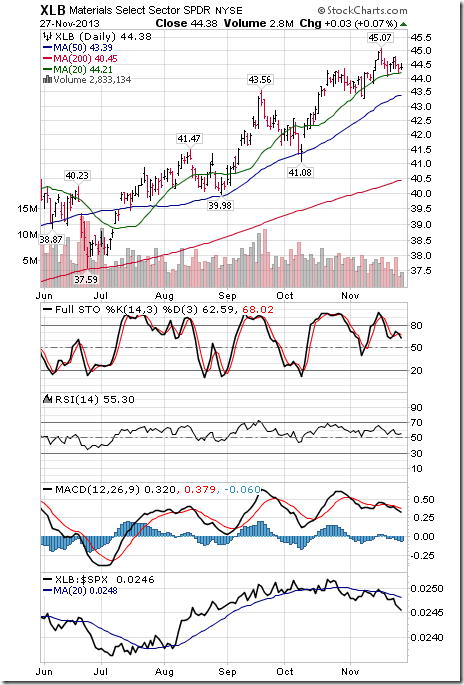
Consumer Discretionary
· Trend remains up. Units closed at an all-time high on Wednesday
· Units remain above their 20 day moving average
· Strength relative to the S&P 500 Index changed from neutral to positive
· Technical score increased to 3.0 from 2.5 out of 3.0.
· Short term momentum indicators returned to an overbought level
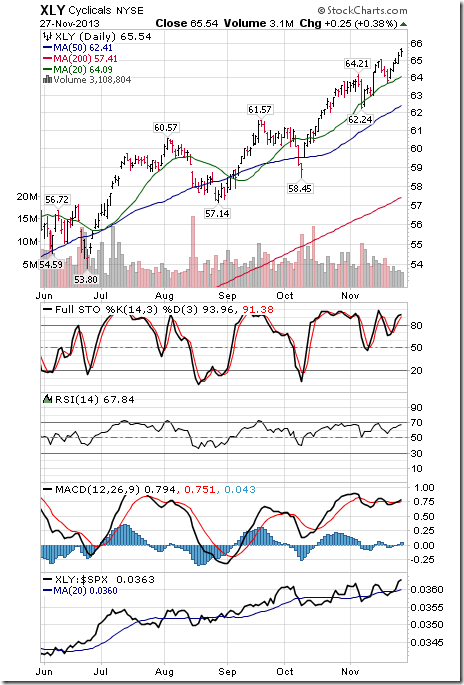
Industrials
· Trend remains up. Units closed at an all-time high on Wednesday.
· Units remain above their 20 day moving average
· Strength relative to the S&P 500 Index improved to positive from neutral
· Technical score increased to 3.0 from 2.5 out of 3.0
· Short term momentum indicators have returned to overbought levels.
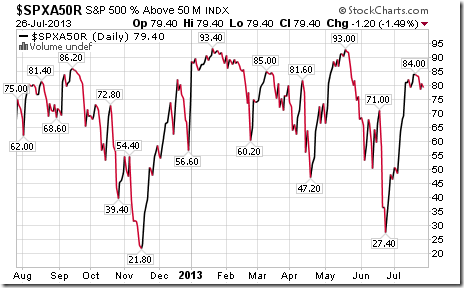
Energy
· Trend remains up.
· Units fell below their 20 day moving average on Wednesday
· Strength relative to the S&P 500 Index remains negative
· Technical score fell to 1.0 from 2.0 out of 3.0
· Short term momentum indicators have rolled over from overbought levels.
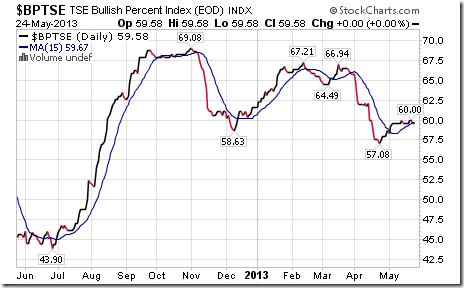
Financials
· Trend remains up.
· Units remain above their 20 day moving average
· Strength relative to the S&P 500 Index remains positive
· Technical score remains at 3.0 out of 3.0
· Short term momentum indicators are overbought.
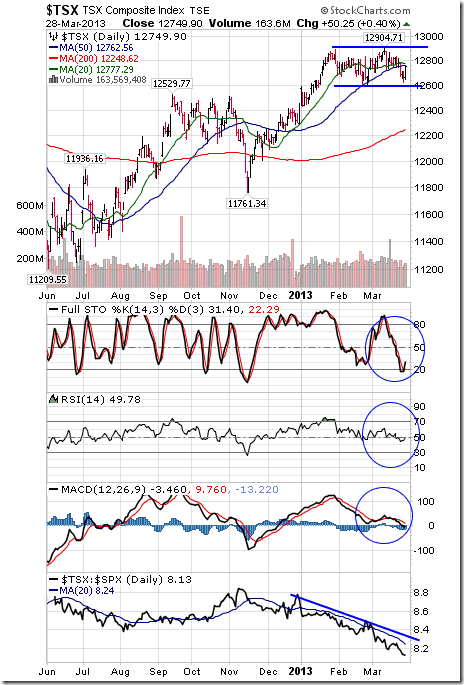
Consumer Staples
· Trend remains up. Resistance is forming at $43.46
· Units remain above their 20 day moving average
· Strength relative to the S&P 500 Index changed from neutral to negative
· Technical score slipped to 2.0 from 2.5 out of 3.0
· Short term momentum indicators are rolling over from overbought levels.
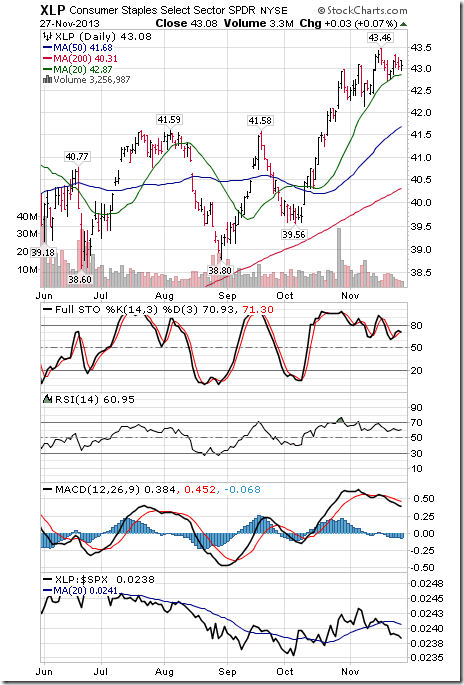
Health Care
· Trend remains up
· Units remain above their 20 day moving average
· Strength relative to the S&P 500 Index remains positive
· Technical score remains at 3.0 out of 3.0
· Short term momentum indicators are overbought.
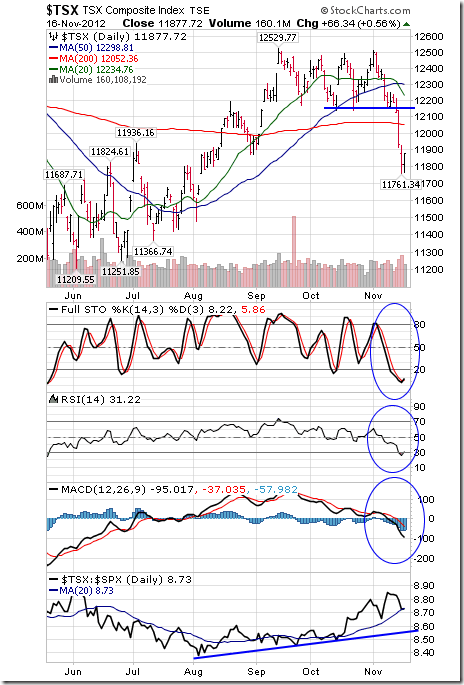
Utilities
· Trend changed from up to down on a move below $38.18
· Units remain below their 20 day moving average
· Strength relative to the S&P 500 Index remains negative.
· Technical score dropped to 0.0 from 1.0 out of 3.0
· Short term momentum indicators are trending down.
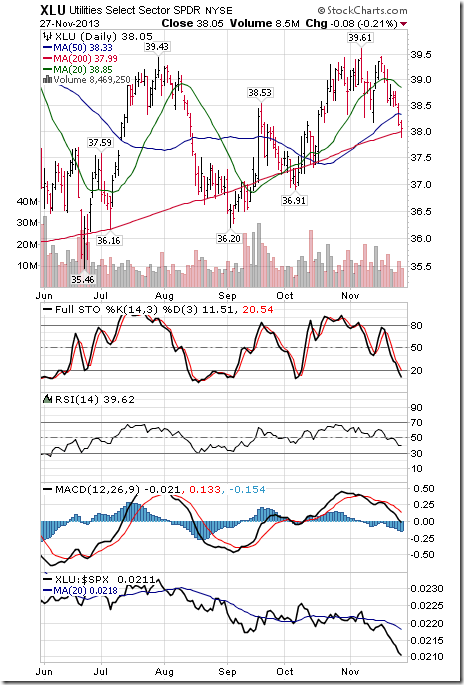
SEASONALITY: Equityclock.com offers free access to seasonal studies on over 1000 big and moderate cap securities and indices, most that have been updated very recently.
To login, simply go to http://www.equityclock.com/charts/
Following is an example:
S&P/TSX Capped Financial Index Seasonal Chart
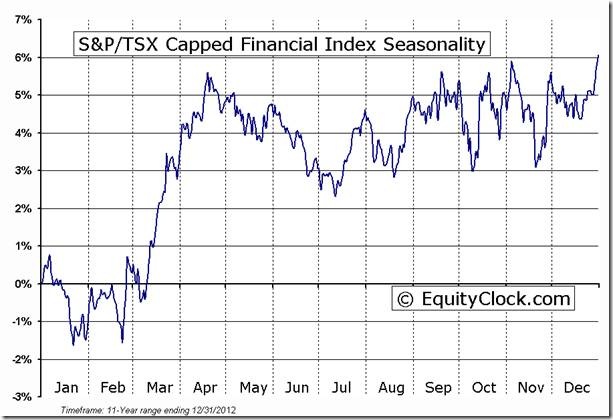


 Given the fact that the asset class of precious metals,
Given the fact that the asset class of precious metals, 











